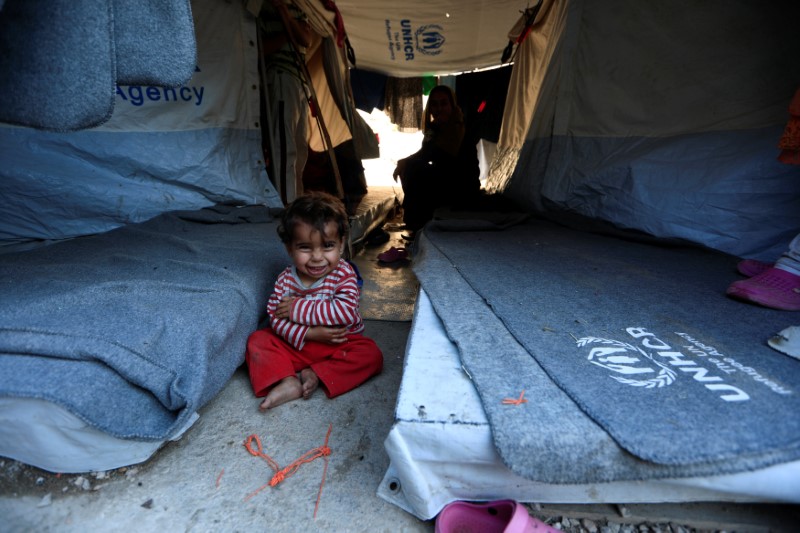
y Zohra Bensemra
CHIOS, Greece (Reuters) – Thousands of refugee woman and children are living in limbo in Greece, waiting for the day they will be reunited with their families in other European countries.
The United Nations Children’s Fund (UNICEF) says nearly 75,000 refugees and migrants stranded in Greece, Bulgaria, Hungary and the Western Balkans are at risk of “psychological distress” caused by existing in a prolonged state of transit.
About 60,000 refugees and migrants, mostly Syrians, Afghans and Iraqis, have been stuck in Greece for over a year after border closures in the Balkans halted the onward journey many planned to take to central and western Europe.
More than a quarter are children and over half the new arrivals have been women and children, according to U.N. data. Men were the first family members to flee to Europe in previous years, leaving others to follow.
“Despair is haunting me at the moment,” said Soha, a 23-year-old Syrian who lives in a tent on the island of Chios with two her two-year-old daughter and other Syrian women.
In the camp, next to the ruins of an ancient castle, overcrowded tents are pitched on the edge of the pebbled shore, and rats roam among the garbage. Women say they are too scared to leave their tents at night, fearing harassment.
Like other women, Soha declined to give her last name or be identified in photographs, fearing it could affect her application to join her husband in Germany.
Family reunification can take between 10 months and two years, UNICEF says, making life particularly hard those left behind.
The uncertainty caused “significant psychological distress and anxiety for children and their families, setting them back for years to come”, UNICEF Regional Director Afshan Khan said.

A one-year-old girl smiles as she sits with her mother, Ibtissam, 22, at the Souda Refugee Camp in Chios island, Greece, June 10, 2017. “I was one month pregnant with my daughter and my son was one year old when my husband migrated to Germany.” Ibtissam, who is from Raqqa said. “I feel devastated, at the moment I can’t apply for family reunification because I have to wait until my husband gets his asylum document…. I feel depressed but I have to keep holding on for my children.” REUTERS/Zohra Bensemra
“I spend most of the day alone,” said Farhiya, a 23-year-old Somali who lives in a volunteer-run camp on Lesbos island.
“The other refugees don’t speak English and I don’t speak Arabic. It’s hard to live alone,” she said. Farhiya applied to join her husband in Austria seven months ago while still pregnant, but has not heard back, she said.
In Athens, 36-year-old Khalissa, who fled Syria with her three young children, spends her days in a drop-in center run by a UNICEF partner, a brief respite from her problems.
She colors in hearts representing her feelings about the past, present and future. The past is blue for sadness, the present brown for fear and the future, in which she hopes to reunite with her husband after two years, yellow for happiness.
Ultimately, she longs to go home.
“If Syria becomes as before the war, I will return home,” she said. “We must return home.”
(Writing by Karolina Tagaris, editing by Ed Osmond)











